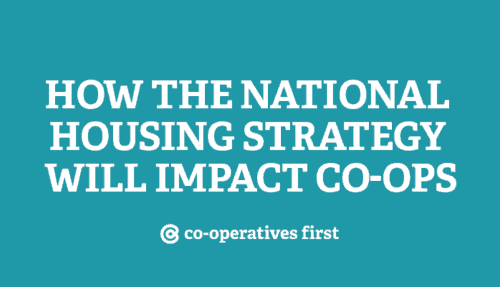On November 22, National Housing Day, Prime Minister Justin Trudeau announced a national housing strategy for Canada. The strategy outlines a commitment of $40 billion over 10-years to housing by the federal government. According to Adam Vaughan, Liberal MP for Spadina-Fort York, the Liberal “government proposed the largest and longest commitment to housing ever seen in this country.”
The announcement signals a re-entry of the federal government into housing following its departure in the early 1990s under Prime Minister Jean Chrétien.
Beyond the announced strategy, the federal government has also taken a strong policy position on housing, declaring that an individual’s right to housing is also a human right. While not yet well-defined, this declaration could impact the whole housing sector, including co-operative housing.
What you need to know about the strategy
The national housing strategy makes commitments to invest in new affordable housing, improve existing affordable housing units, protect those in affordable homes, offer households financial assistance for housing, and reduce homelessness.
Here’s a quick breakdown of the strategy’s objectives:
- Build 100,000 new affordable housing units.
- Repair 300,000 affordable housing units.
- Cut chronic homelessness by 50 per cent.
- Protect 385,000 households from losing an affordable home.
- Provide 300,000 households with financial assistance through the Canada Housing Benefit.
- Remove 530,000 households from housing need.
Source: http://www.cbc.ca/news/politics/housing-national-benefit-1.4413615
It should be noted that much of the funding for housing included in the strategy was already announced in the 2017 budget, and the housing benefit for families does not start until after the next federal election in 2020. That said, the strategy does have implications for co-operative housing. Here’s our take.
What all this means for co-operative housing
In some ways, the substance of this strategy aligns quite well with the principles of many housing co-ops across Canada. For example, the Co-operative Housing Federation of Canadaclaims that housing co-ops “provide at-cost housing for their members.” Without question, housing co-ops do provide shelter, and members share resources in the housing facility, which reduces individual costs. Likewise, the goal of many housing co-ops is to make housing more affordable. This commitment by housing co-ops to affordable, often inclusive, housing seems to support the federal government’s strategy.
While there is little mention of housing co-ops explicitly in the announcement, two significant impacts this national investment could have on co-ops in the housing sector include continued funding for social housing and a target of 100,000 new affordable housing units.
Renewed commitments
According to yesterday’s announcement, the federal government will continue funding introduced in the 1970s and 1980s for housing co-ops. The earlier funding was part of social housing programs for lower and middle-income households. Many of the housing co-operatives that exist across Canada formed to access this funding.
In recent years, these agreements have been ending, and there was uncertainty whether the federal government would continue funding the programs, which threatened numerous housing organizations. The national housing strategy clarifies the federal government’s position and provides a commitment to continuing this funding.
New opportunities
As noted above, the strategy sets a target of creating 100,000 new affordable housing units. Many of these units will likely be created in partnership with existing non-profit housing providers and provincial government-led initiatives. However, groups interested in leading their own development of affordable housing could potentially use the co-op model to access these funds.
Structuring a proposal can sometimes benefit from third party support. If you’re considering a co-op, contact us. We’re happy to help or direct you towards someone who can.
A promise to vulnerable households
Depending on how the next federal election goes, another potential benefit for members of housing co-ops is the new Canada Housing Benefit. According to the announcement, the federal government will earmark $2 billion – in partnership and with matching funds from provincial governments – directly to vulnerable households.
If this comes to fruition, the federal government hopes to assist around 300,000 households. The benefit may also provide some security for housing co-op members struggling to afford their homes.
Housing is clearly a priority for the feds
From a policy perspective, the national housing strategy makes housing a significant government priority federally. In addition to the strategy, the government also plans to introduce legislation requiring the federal government to maintain a national housing strategy and report on targets and outcomes.
Housing is a top priority for many community leaders we speak with from rural and Indigenous communities across western Canada. We think housing co-ops are well positioned to benefit from a federal focus on housing, and look forward to capitalizing on opportunities with groups across western Canada.
If you’re interested in learning more about co-op housing, contact us.

 Written by
Written by 



